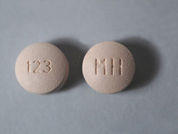Ergotamine-Caffeine
Ergotamine Tartrate/Caffeine
What is Ergotamine-Caffeine used for?
This combination medication is used to treat or prevent certain types of headaches (vascular headaches including migraine and cluster headaches). Headache pain can sometimes be caused by widened blood vessels in the head. Ergotamine works by narrowing these widened blood vessels. Caffeine increases the absorption of ergotamine and also narrows widened blood vessels.
CHEMICAL NAME
DRUG TYPE
Migraine HeadachesErgotamine-Caffeine Prices
Searching for the lowest prices
What does Ergotamine-Caffeine look like?
View all Ergotamine-Caffeine Image Information (1)Ergotamine-Caffeine Frequently Asked Questions
This medication has rarely caused a serious lack of blood flow to the arms/hands, or to the feet, or to the brain, which could cause a stroke. The risk is increased when this medication is taken with other drugs that can affect the removal of ergotamine from your body. Examples include mifepristone, telithromycin, certain antidepressants (such as nefazodone), azole antifungals (such as ketoconazole, itraconazole), cobicistat, macrolide antibiotics (such as clarithromycin, erythromycin, troleandomycin), HIV protease inhibitors (such as nelfinavir, indinavir), ritonavir, SSRIs (such as fluoxetine, paroxetine, fluvoxamine), among others.
IMPORTANT: HOW TO USE THIS INFORMATION: This is a summary and does NOT have all possible information about this product. This information does not assure that this product is safe, effective, or appropriate for you. This information is not individual medical advice and does not substitute for the advice of your health care professional. Always ask your health care professional for complete information about this product and your specific health needs.
